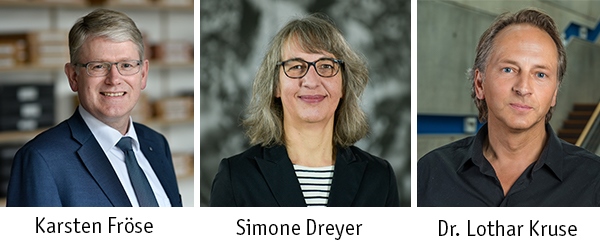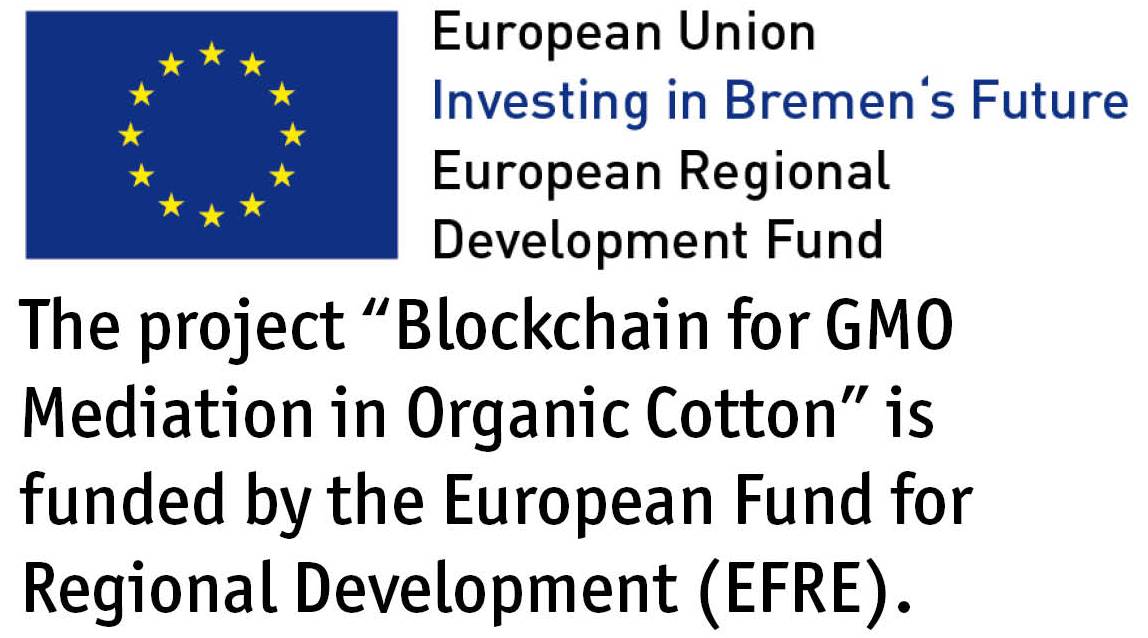Interview with Karsten Fröse, Director of Cotton Quality at the Bremen Cotton Exchange, Simone Dreyer, Project Manager of the Bremen Cotton Exchange and Dr Lothar Kruse, Executive Manager Impetus Bioscience.
Since 2018, the Bremen Cotton Exchange has been working together with the Bremerhaven biotechnology company Impetus Bioscience on the project ‘Blockchain for GMO Mediation in Organic Cotton’. The project is funded by the European Regional Development Fund (ERDF). On the one hand, the aim was to develop a tailor-made blockchain concept. On the other hand, it also aimed to expand analytical DNA testing methods for the raw material cotton.
At the end of the project, the Cotton Report editorial team spoke to those responsible: Karsten Fröse, Director of Cotton Quality at the Bremen Cotton Exchange, who initiated the research project, Simone Dreyer, who led the project for the Bremen Cotton Exchange and Dr Lothar Kruse, the responsible project partner at Impetus Bioscience.

Cotton Report: Was is the idea behind the project?
Karsten Fröse: The starting point of our project is the increasing use of organic cotton in the supply chain. In the past, despite existing certificates, there were always reasonable doubts about the authenticity of the organic cotton in a textile product and the correctness of the associated advertising message. An essential feature of organic cotton is that it is free of genetically modified organisms (GMOs). GMOs can be detected in raw cotton by testing the DNA of the fibres. One aim of the research project was to find out to what extent cotton DNA and the associated GMOs can be detected not only in the harvested cotton fibres, but also in finished textiles. In addition, it was to examine which processing steps of the finished textile influence this evidence. In response to increased security requirements in the complex supply chain, the possibility of implementing a blockchain was also to be investigated.
Why is this a useful area of research for the Bremen Cotton Exchange?
Karsten Fröse: The Bremen Cotton Exchange has been acting as a court of arbitration for almost 150 years to ensure the smooth running of the cotton trade. Of course, our expertise here lies in the field of cotton quality testing. Nevertheless, transparency and traceability are becoming more and more important for many participants in the textile supply chain. Including additional properties of the advertised cotton in our testing portfolio and offering the corresponding services to ensure the results is an obvious step. Together with our partner Impetus and the ICA Bremen, we are already being asked to check the accuracy of sustainability statements.
What are the advantages of using blockchain technology?
Simone Dreyer: With the use of blockchain technology, we are going one step further in securing and forwarding tested information within the network of a supply chain, which also picks up on the current trend towards digitalised processes. The decisive advantages of the blockchain are its high level of security, decentralised storage and independence. The technology can make a fundamental contribution to increasing the trustworthiness of certificates or contractually agreed product statements. It is particularly interesting because of a certain anonymity of the data. Many companies in the highly competitive textile chain would benefit from this, as they would not have to disclose any confidential data.
What examinations did you carry out as part of the laboratory tests and what were your findings?
Dr Lothar Kruse: A major goal was to refine the GMO analysis methods and also to test processed cotton in the form of preliminary and finished products. We have succeeded not only in proving that GMO content is present in products sold as organic cotton or organic cotton textiles, but also to make statements about the proportionate amount. It was important to us to improve the quantifiability of DNA, also in terms of defining possible limit values. We were actually able to extract DNA from many end products and sometimes determine serious deviations from the results expected on the basis of the respective offer.
Which processes destroy DNA so that it can no longer be detected in the finished product?
Dr Lothar Kruse: We were amazed at how much DNA we could still detect. We know that chlorine bleach definitely destroys DNA, hydrogen peroxide less so. In addition to dyes, there are a variety of chemical finishing processes that may also reduce DNA. Further research is needed here.
What significance do your results have for DNA analyses in the future?
Dr Lothar Kruse: Basically, it could be said that we have reached a turning point in the DNA analysis of cotton. Uniform and precise procedural steps for carrying out GMO analyses of cotton have been agreed for the first time in an International Working Agreement Protocol from the International Organisation for Standardisation (ISO). Impetus Bioscience is already two steps further and one of the few laboratories in the world which can also identify a specific genetic modification, as well as quantify it. In the context of these developments it is important to improve the comparability of tests and laboratories in round tests in the near future. I also advocate setting a limit value for minor GMO contamination, similar to that in the food industry. However, for this too, test procedures must be standardised in such a way that a meaningful value is defined for cotton tests.
What is the next step in the project? Do you now start implementing the findings?
Simone Dreyer: Firstly, let us put on record that blockchain is a useful technology to simplify certificate management in the cotton trade and make it more transparent. In the future, a corresponding platform could emerge in the cotton trade that is secured with the help of blockchain technology. The various providers of certificates and seals would have the opportunity to enter documents there and make them accessible for everyone involved in the supply chain. We are in talks with various companies to start implementing the knowledge gained in practice.
Thank you for the interview.
For more information turn to:
Karsten Fröse
phone +49 421 33 970-18
froese@baumwollboerse.de


